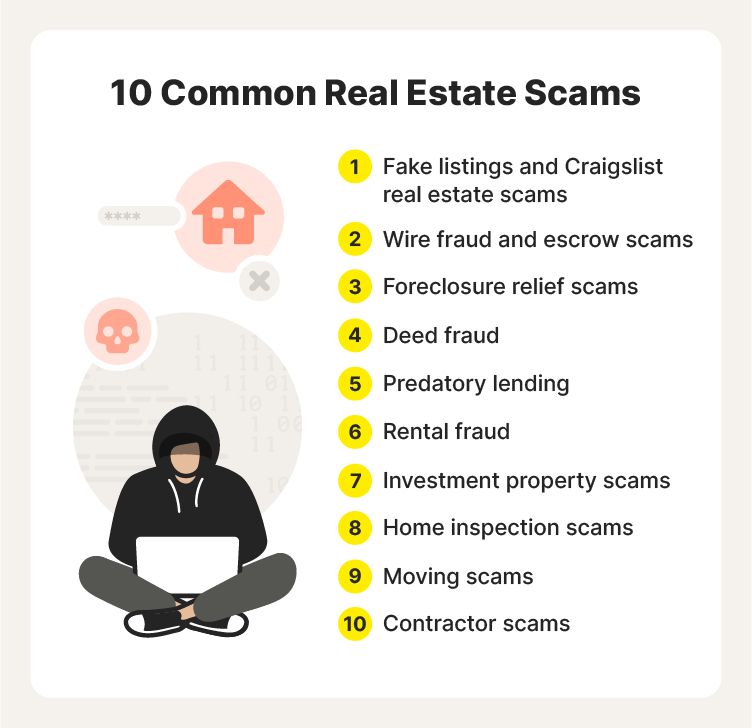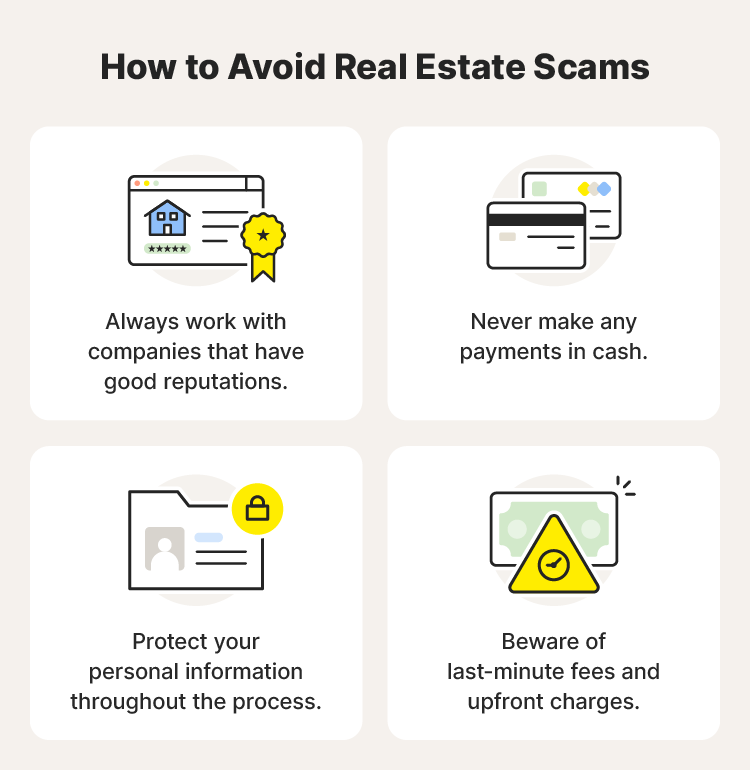In 2022 alone, the FBI received 11,727 real estate fraud complaints that cost people almost $400 million in total. If you don’t want to be one of those people, keep reading to learn more about some common real estate scams and how to avoid them.
Real estate scams to look out for
While no two scams are identical, they tend to follow the same basic formulas. With a little knowledge, you can spot housing scams before you lose time or money. Let’s take a look at ten common kinds of real estate fraud.
1. Fake listings and Craigslist real estate scams
To create fake listings, scammers craft property ads that feature properties at unrealistically low prices. They’ll use stolen photos and descriptions from legitimate posts to create listings that look real. When a potential buyer contacts the scammer, they’ll request personal information or upfront payments before disappearing with your money.
Craigslist is a popular site for digital real estate scams because of how many people use it and because there is little oversight. Scammers on Craigslist create fake listings and use bait-and-switch tactics to show a nice property before presenting a different (usually run-down) property.
2. Wire fraud and escrow scams
Escrow arrangements are attractive targets for scammers. They might call, send you an email, or text you, claiming that they represent your title or escrow company. They’ll ask you to send the money you need to open your escrow account to a bank account they created. When you do this, they’ll take your money and disappear.
It can be easy to fall for these wire transfer scams, especially during the hectic days of closing a mortgage loan and buying a home. Scammers create email addresses or phone numbers that look almost identical to those used by your legitimate title or escrow company.
How to avoid these scams:
- Look closely at all communications: If someone contacts you asking you to send your escrow money to a new account, take a closer look and make sure the email address or text number is real. Even this isn’t a surefire way to detect fraud as phone number spoofing can make a call from a scammer look real.
- Always double-check changes: If you get a message or phone call from someone claiming the arrangement has changed, don’t act immediately. Call your real estate agent, lender, or title company to ask if the change is legitimate. If it’s not, don’t send any money.
- Contact your bank: If you wire money to a scammer, call your bank or wire service immediately and request a halt on the transfer. If you act quickly enough, they might be able to stop the transaction from going through.
3. Foreclosure relief scams
In a foreclosure relief scam, con artists contact homeowners whose lender may have begun foreclosure proceedings on the home. The scammer promises the owners that they can help them save their home and reduce the homeowners' monthly mortgage payments to a level that they can afford. They'll even point owners toward websites that look legitimate.
These scammers will often request an upfront payment for their services. And if you pay, they'll take your money and disappear.
How to avoid these scams:
- Work directly with your lender: Your lender is the only company that can help you if you’re facing foreclosure. They may be able to offer lower payments or forbearance.
- Hang up the phone if these companies call: If a company tells you not to speak with your lender, it’s a clear red flag. Always contact your lender if you’re suspicious about any changes.
4. Deed fraud
Deed fraud is when someone steals your identity, forges your name on a deed, and tries to commit home title theft. What’s really scary is that you might not discover this type of fraud until you try to sell your home.
Vacation homes, abandoned homes, or unoccupied homes are often the targets of deed fraud, but scammers sometimes target occupied homes, too. If you’ve fallen victim to deed fraud, you might receive a notice for an unpaid water bill, tax bill, mortgage bill, or foreclosure notice on a property you don’t own or occupy.
How to watch out for these scams:
- Monitor your credit reports: Look for financial actions taken in your name that are not familiar. You can request a free credit report annually from the three major credit reporting agencies—Equifax®, Experian®, and TransUnion®. It’s also possible to get credit monitoring, as well as title monitoring, through an identity theft protection service.
- Access deed records directly: If you’d rather monitor your title by yourself, you may be able to access those records online through the local county recorder. Confirm with them (or state agencies that have those records) that no one has done anything affecting your property ownership.
- Get insured: You might also consider an owner’s title insurance policy, which can offer some protection against the harm deed fraud causes.
5. Predatory lending
Predatory lenders prey on borrowers who don’t have good credit scores, typically charging them sky-high interest rates on mortgage loans. These high rates can leave borrowers with monthly payments they can't afford.
Homeowners then run the risk of losing their homes to foreclosure if they start missing payments—while the predatory lenders happily collect the profits from those higher interest rates.
How to avoid these scams:
- Know what current rates are: Research current mortgage interest rates before applying for your mortgage. Lenders may charge borrowers with weaker credit higher-than-average interest rates, but they shouldn't charge you an interest rate that is significantly higher than the average.
- Consult your real estate agent: Real estate professionals always work with different lenders, so they’ve probably helped people with financial circumstances similar to yours. Ask them if they have a go-to lender or know which lenders to avoid.
6. Rental fraud
In a rental scam, scammers create fake rental properties on listing sites using photos and descriptions of a real home. They ask you to send a security deposit and their first month's rent through an electronic transfer and an application.
The listing says they won't show the apartment or rental property until they receive this deposit, promising to refund the money if you don't rent the home. But if you send money, the scammers take it and disappear.
How to avoid these scams:
- Visit the property: Scammers will never actually show you a rental property. Instead, they will make excuses about being busy or out of the country. If they won’t let you see a place you’re trying to rent, it’s a fake listing.
- Never send money upfront: If someone requires a cash deposit before showing you an apartment, they’re scamming you. Legitimate property owners won't do this. They'll let you tour a property before asking for any cash.
7. Real estate investor scams
Investing in property can be a good idea, and having a steady source of passive income from an investment property can be hard to pass up.
Investment property scams take several forms, including:
- Timeshare or shared investment properties
- Illegally flipped homes
- False valuations
- Real estate investment seminar scams
How to avoid these scams:
- Do your due diligence: Many scams are illegal, but many other scams are just bad investments. Take your time and talk to experts before investing in real estate.
- Avoid anything that sounds too good to be true: Very few get-rich-quick schemes actually work. Owning property is an investment of energy and time as well as money. Get-rich-quick schemes like the Telegram investment scam offer large profits with little effort. However, this is just a ploy to get your money.
8. Home inspection scams
An important part of buying a home is having it inspected. An inspector will look for problems to provide you with a better picture of what you’re buying (and can potentially help you save on the purchase price).
But not all home inspectors have your best interests in mind. Some work with sellers to provide inspections that gloss over major problems, while others don’t have the skills or experience needed to make an accurate appraisal. This can leave you with a house with many problems that cost a lot of money to fix.
How to avoid these scams:
- Do your research: Talk to your real estate agent about who they trust for accurate inspections, and read online reviews before hiring an inspector.
- Don’t rely on a seller’s inspection: While most sellers aren’t trying to scam you, getting a second set of eyes on a property can provide peace of mind.
9. Moving fraud
When you move, your moving company will provide an estimate of how much they'll charge to move your belongings. They might also require you to pay a deposit upfront. But moving fraud typically happens once the movers drive up to your new home. They’ll demand a higher price to unload your belongings, and if you don't pay up, they threaten to leave with your items still in their truck.
If you do encounter moving fraud, be sure to file a complaint. You can file one with the Federal Motor Carrier Safety Administration if the fraud occurs across state lines. If the fraud occurs with an in-state move, file a complaint with your state agency, which you can find here.
How to avoid these scams:
- Check reviews first: Make sure potential movers have proper insurance. Check online reviews and the Better Business Bureau for complaints.
- Get an estimate in writing: Understand all the charges your movers will levy, and be sure they send you a written estimate.
- Don’t pay in advance: Legitimate movers will ask you to pay up after unloading your belongings.
10. Contractor scams
Most states require contractors to be licensed and insured for a reason—it’s a very difficult job that can have a tremendous impact on a homeowner’s finances and safety.
Scams involving contractors can take many forms. They may overcharge for work, go back on an estimate, do poor work, or they may not do any work after taking a substantial deposit from you. You should also avoid contractors going door to door. The most successful contractors are so busy that they don’t need to be in your neighborhood looking for work.
How to avoid these scams:
- Get trusted recommendations: The people in your social circles can be a huge help when looking for a trustworthy contractor. Ask as many questions as possible about pricing, deadlines, the quality of work, and how easy it is to work with a contractor.
- Get multiple quotes: Once you have a list of potential contractors, ask them for quotes. Generally, they should be fairly similar. You should probably avoid them if they are very low or very high. While some high-end contractors charge a premium, it won’t be worth it for most jobs.

How to avoid real estate scams
While you might not be able to avoid all scammers, you can avoid getting scammed by following simple guidelines. The tips below can help you determine what questions you should be asking and how to spot red flags.
Work with reputable companies
Buying a home is the biggest investment the average person makes in their lifetime. Because you’re committing to something that will last for decades, finding the right people and businesses to help you along the way is important.
Here are a few ways to find trustworthy companies:
- Ask friends, family, and coworkers for recommendations.
- Read online reviews of potential real estate agents, builders, inspectors, and contractors.
- Visit the Better Business Bureau’s website to look for reputable businesses.
- Check out professional organizations to see which members are in good standing.
Choosing the right group of professionals can enormously impact how smoothly the process goes, and they can help you save money and find the home of your dreams.
Never pay with cash
Professionals in the real estate industry don’t ask for cash payments. Nor do they ask you to pay in cryptocurrency or gift cards. You will do most transactions through wire transfers, credit or debit cards, or by check. This is for their protection as much as yours because it creates a paper trail.
Scammers will often ask you to do things in ways that are tough to trace. Be careful about paying in cash or cryptocurrency or falling victim to a Zelle scam. These payment methods are more difficult to trace, making them perfect for criminals who want to take your money and run.
Keep personal information safe
Real estate transactions, whether you’re buying a home or renting a condo, can feel borderline invasive because of the depth and breadth of the personal information that you’re required to provide. During a real estate deal, you’ll probably be sharing your:
- Name
- Birthdate
- Address
- Phone number
- Social Security number
- Bank account numbers
- Credit card statements
- Employment information
- Retirement account information
- Tax returns
Because so much of your personally identifiable information will be changing hands, it’s important to understand who will have access to it and why they need it. If you don’t feel comfortable sharing your information, ask how the other party will keep it safe and what kind of safeguards (like the types of encryption they use) are in place to protect your identity and finances.
Never feel bad about double-checking where your data is sent or confirming a legitimate request. Taking a small step to protect yourself from identity theft is always worth it.
Be wary of upfront and last-minute fees
The process of buying and selling homes is heavily regulated because of the number of fees and the amount of money involved. Because of this, real estate businesses either aren’t legally allowed to charge upfront or last-minute fees or don’t need to do so because of how the system is set up.
If a company is trying to charge you before they review your rental application or try to tack on a bunch of fees before closing, it might mean it’s a scam. If you aren’t sure about a fee, check the contracts you signed when the process began.

How to report real estate scams
It’s in every home buyer and seller’s interest to report and remove scammers from the real estate industry. So, if you encounter a real estate scam, always report it to help protect others. Here are a few ways to report fraudsters.
- File a report with the FTC: The FTC has a website for reporting fraud, including real estate scams.
- Contact local authorities: If a scammer commits a crime, you should report them to local law enforcement. Though many scammers commit fraud across state lines, reporting them can help investigators build cases in cooperation with other agencies.
- Contact the Better Business Bureau: If a scammer operates a business, reporting them to the BBB can help others avoid them. Reviewing them online is another way to get the word out that someone shouldn’t trust a business.
Protect yourself during real estate deals
Safeguarding your identity when buying or renting a home isn’t always a simple task. But you can rest easier with help from experienced experts who know how to look for fraudulent uses of your personal information.
Sign up for comprehensive identity theft protection from LifeLock Total today for peace of mind thanks to 24/7 dark web monitoring, automatic notifications if someone uses your SSN, and expert legal and technical assistance to help you if your identity is stolen.
FAQs about real estate scams
Still have questions about real estate scams? We’ve got answers.
What are Zillow scams?
There are several kinds of Zillow scams. Some scams involve fake listings created by scammers who don’t own the property they’re trying to sell, while others are bait-and-switch scams. Beware of buyers who offer to purchase your home sight unseen—they could be scammers, too.
How do you know if a cash buyer is legit?
Most legitimate cash buyers are professionals who make their living buying and selling property. They will offer references and usually make a fair offer, but they won’t be overeager or pushy.
How can I tell if a rental is real?
The best way to determine if a rental is real is to contact the property owner (or manager) and schedule an appointment to see the property. If they let you visit the property without requiring a deposit, it’s almost certainly an actual rental—but remain vigilant for other signs of deceptive or fraudulent practices.
Are businesses that offer to buy houses in any condition scams?
Not necessarily—some businesses buy old, distressed, or rundown homes to rehabilitate and flip them, which is legal in most places. However, some companies will offer to buy a home for much less than it is worth. Although not fraudulent, it is predatory because they are counting on desperate homeowners who need money to take whatever they can get at a time of real need.
Editor’s note: Our articles provide educational information. LifeLock offerings may not cover or protect against every type of crime, fraud, or threat we write about.
Start your protection,
enroll in minutes.
LifeLock is part of Gen – a global company with a family of trusted brands.
Copyright © 2026 Gen Digital Inc. All rights reserved. Gen trademarks or registered trademarks are property of Gen Digital Inc. or its affiliates. Firefox is a trademark of Mozilla Foundation. Android, Google Chrome, Google Play and the Google Play logo are trademarks of Google, LLC. Mac, iPhone, iPad, Apple and the Apple logo are trademarks of Apple Inc., registered in the U.S. and other countries. App Store is a service mark of Apple Inc. Alexa and all related logos are trademarks of Amazon.com, Inc. or its affiliates. Microsoft and the Window logo are trademarks of Microsoft Corporation in the U.S. and other countries. The Android robot is reproduced or modified from work created and shared by Google and used according to terms described in the Creative Commons 3.0 Attribution License. Other names may be trademarks of their respective owners.





